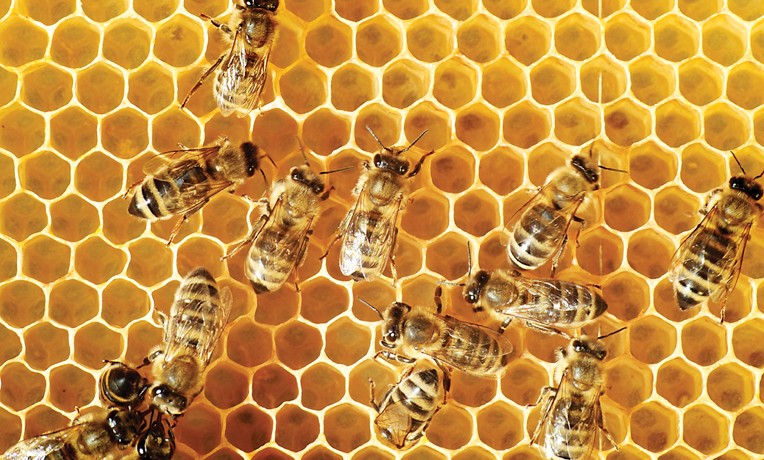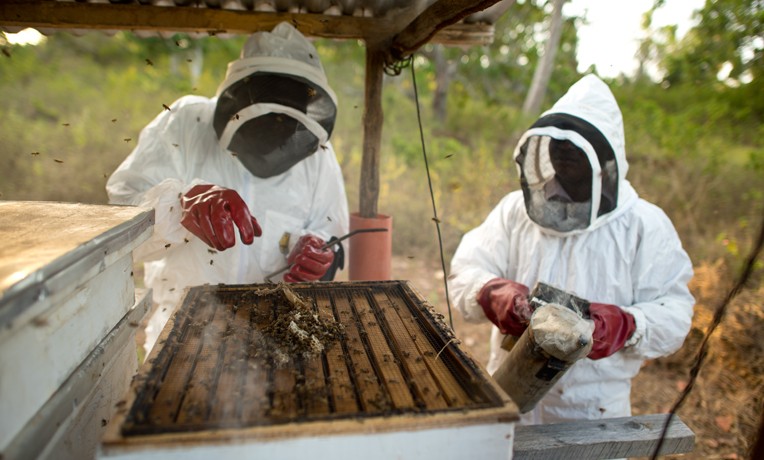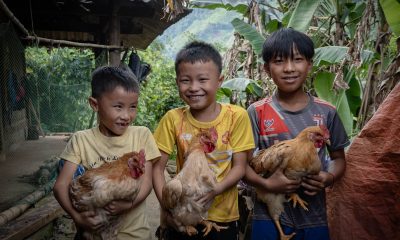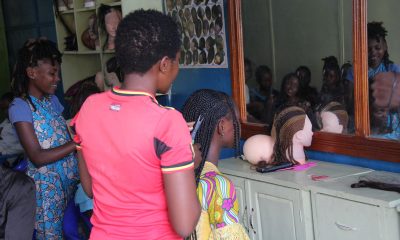A Samaritan's Purse beekeeping program in Kwale County is addressing physical and spiritual poverty
The three groups of apiarists Pastor Francis Mgalla leads at his church in Bahakanda village are known collectively as Canaan Beekeeping.
“Though we have been in bondage to poverty, now God has delivered us through Samaritan’s Purse,” he said. “We are headed to Canaan, the land of honey and milk.”
With profits from group sales of fresh honey, Ali, a Canaan member, has put a better roof on his house and also paid medical expenses and school fees. Kitemi, another member, has purchased clothing and a chicken for his family. He is able to pay his children’s school fees too.
“I get income while still farming, without having to go looking for casual [seasonal/temporary] labor,” Kitemi said.

Pastor Francis Mgalla with honey from his Samaritan’s Purse beekeeping group.
Pastor Francis, who is married with two young children, uses his honey money to pay for his commute from Kwale town to the homes of his 60 or so church members. He also invested in his congregation’s building project, and they now have a concrete worship center.
Rising Above Poverty
It’s a good time to be a beekeeper in Kenya.
“Right now there is a high demand for honey because the supply is low. The market is there,” said Samson Njenga, Samaritan’s Purse livestock program manager.
Samaritan’s Purse has provided training, a beekeeping kit, and five hives to more than 300 households since the program started in Kwale County in 2007. The bee kits include a full suit, gloves, boots, a smoker, hive tool, bee brush, and flashlight.
Every two or three groups (about 10 households per group) receive a nine-frame centrifuge to share. Once the honey is processed, it goes into a food-quality plastic tank before being packaged and sold.

Members of the Canaan Beekeeping collective don their suits.
Francis became a beekeeping beneficiary about the same time he planted his church five years ago. Others he works with received their hives two years ago. He emphasizes the importance of the kits and training they’ve all received. Without them, people would get stung too often and simply abandon their hives, he said.
After training, novice beekeepers construct a shelter near their home to house the hives. The hives are next placed in a forested area and filled with beeswax. It’s then a waiting game.
Swarming season occurs just before the rains come, as bees are on a desperate search for water. Once the bees enter the hives, they are moved to the back of the shelter.
In Kwale, keepers should get two harvests per year, during August and December. Each hive can produce an average of 10 kilograms of honey. Not every hive will produce, but successful beekeepers can expect to earn enough from honey sales to rise above the local poverty line.
One ongoing advantage to beekeeping is low-cost maintenance.
“Bees are free,” Kitemi said. “After the initial investment, you don’t have to invest more. [They’re] not like a cow. If it dies, you have to buy a new one.”
In addition to beekeeping training, beneficiaries receive financial education from Samaritan’s Purse staff that equips them to wisely use their new resources. They are encouraged to invest in education, goats, and their honey business.
Opportunities to Share Good News
Not only has the beekeeping program helped alleviate physical poverty, it has opened doors for the Gospel in Kwale County, a region that is home to a mix of Muslim and Christian people groups. Many also mix in traditional African religion. Beneficiaries hail from these diverse backgrounds.
“Every one of our programs has a ministry component,” said Patrick Gitonga, deputy country director for Samaritan’s Purse Kenya.
Pastor Lawrence Apopo coordinates the ministry aspect of the Kwale livestock program. Church leaders in villages where we have distributed hives or goats can participate in a four-month evangelism and discipleship training. The Jesus film is regularly shown to large groups. There is an additional three-day course on Muslim outreach as well.
Local pastors throughout the county are reporting that many are coming to faith in Christ through the program, and tribes that were previously hostile are becoming more receptive. Pastor Francis, who has gone through all our trainings, sees changes in Bahakanda village.
“It’s brought light to the community about the love of Christ,” he said. “This project has broken the barrier between Christians and Muslims. Every time we meet we have to share the Word of God.”
Before the beekeeping project started in Bahakanda, local Muslims generally would not step foot in a Christian house of worship. Now some are among those who gather for Canaan meetings at the church and come to use the centrifuge stationed there. Many readily acknowledge the positive benefits the church has brought them.
Francis reports some Muslims are now telling him, “OK, we have heard this [Christianity] wasn’t good for us, but we see some light in this.”
The young pastor believes a spiritual breakthrough is coming.
“We are going to see men and women from the Muslim community in the church,” he said. “We really thank God for what Samaritan’s Purse has done.”







